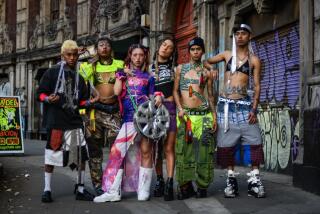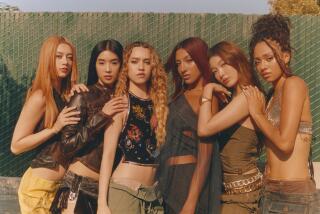A Tradition Burns Bright : Cuban Heritage of Making Cigars by Hand Flourishes at Tiny L.A. Shop
As factories and retail outlets go, Gilberto Leon’s isn’t one of the giants.
About eight feet wide and 50 feet long, it’s crammed between a rug shop and a tarot card reading room on 6th Street, a couple of doors west of Western Avenue.
But that’s all Leon needs to manufacture--and, when things are going well, sell--about 600 cigars a day.
We’re not talking about smuggled-in, $50 Cuban Hoyo de Monterreys, the kind smoked in Beverly Hills boardrooms. Leon’s cigars are more modestly priced--between 90 cents and $2 apiece--the kind smoked by discerning truck drivers and devoted Los Angeles cops.
Like the Hoyos, though, Leon’s cigars are handmade. Like Leon himself, they share a Cuban heritage. “These are authentic, sincere cigars,” said regular customer Gary Artinian. “These are good.”
Leon, now 74, came to this country from his native Cuba after the Castro revolution. After a stop in Miami, he headed west in 1981, setting up his little shop on 6th.
Littered with tobacco trimmings and decorated with drawings of Catholic saints, a 2-year-old calendar, an American flag patched with masking tape and a quote--”Sometimes a cigar is just a cigar”--attributed to Sigmund Freud, Leon’s cramped shop is not your typical Wilshire district boutique.
But its following is faithful, including people like Police Chief Willie L. Williams, trucker Hardy Johnson and Artinian, a 29-year-old who hangs around enough to have become something of an expert on Leon and his shop.
*
Leon is a man of few words, either in his native Spanish, which he does not use much, or in English, which he uses even less. Armando Guerrero, 70, Leon’s veteran assistant, is similarly taciturn.
So Artinian, a more voluble type, comes in handy, explaining the layout to visitors and translating Leon’s occasional Spanish utterances.
Being linear in shape, Leon’s place is basically one long, narrow assembly line.
At the back are the bales of tobacco, wrapped in plastic to keep them from drying out. Since the U.S. embargo keeps Leon from purchasing Cuban tobacco--”the best in the world,” he told Artinian--he buys tobacco grown from Cuban seed in El Salvador, Honduras, Mexico and some Caribbean countries.
*
Four small desks are arranged along the walls leading to the front of the shop.
On a recent day, Anna Mendoza, 47, sat at one of them; the one beside her was empty. “Teresa is usually here, too,” she said, “but this is her day off.”
Mendoza’s desk was piled with different types of tobacco. Leon explained through his translator that each type has a distinctive flavor and aroma. He said different blends result in the seven kinds of cigars marketed at the store.
Mendoza performs the first steps in making a cigar--selecting various filler tobaccos for a particular blend, arranging the cut leaves so the finished cigar will draw smoothly, wrapping the filler in a single binder leaf and placing the resultant cylinder in a matching groove in a wooden press.
After the embryonic cigars have been pressed to the boss’s satisfaction--usually for somewhere between a couple of hours and a couple of days--they are placed on the desks of Guerrero and Leon.
Using a handle-less steel blade called a chaveta, each man carefully trims the stem from a thin, top-grade wrapper leaf, which he then wraps smoothly around the binder and filler. The only adhesive is a small dab of vegetable oil that is used to seal the loose end of the wrap. Snipped clean at the open end (the one that’s lit), the cigar is ready to sell.
Sales are made at the small glass counter at the front of the store.
There’s not a lot of chitchat. Most of the customers know what they want and how much it will cost. “The price of a cigar mostly has to do with what goes into it,” Artinian said. “The more expensive the tobacco, the more expensive the cigar.”
Johnson, the trucker, was in and out in less than two minutes, heading down the street with 25 fumas. “Ninety cents apiece,” he said. “Not bad for a real, hand-rolled cigar.”
Jerry Velona, a retired broadcast executive from Sherman Oaks, lingered a little longer, selecting his $2 presidentes one at a time.
“They’re always fresh,” he said with enthusiasm. “They draw well. They taste real good.” The transactions complete, Leon shoved the money into his pocket--he doesn’t use a cash register--and entered the sales on a sheet of paper.
“Taxes,” he muttered in English.


